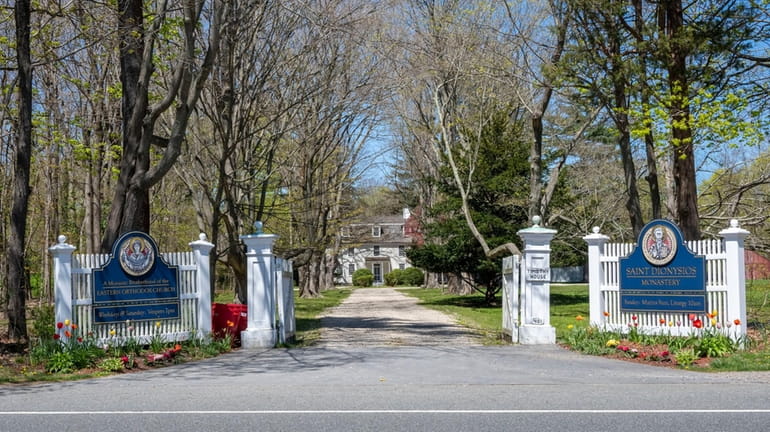Lawsuit: Head of the Harbor trustees broke law with vote for church project

Some Head of the Harbor residents are suing the village and this Russian Orthodox monastery, alleging the village failed to consider how a proposal to build a church next to the monastery would affect the environment when voting to grant a special permit. Credit: Rick Kopstein
Some Head of the Harbor residents are suing the village and a local Russian Orthodox monastery, alleging the village failed to consider how a proposal to build a church next to the monastery’s historic home would affect the nearby environment, according to court documents.
The lawsuit says village trustees acted “in violation of law” when voting in March to grant a special use permit to the Monastery of Saint Dionysios the Areopagite to build a house of worship in a residential zone.
The lawsuit seeks to void the trustees' March decision to approve the special use permit along with their finding that under state environmental law, the project would have no harmful impacts on the surrounding area.
Mayor Michael Utevsky, who was elected shortly after the permit vote, said in an interview the church project still can move forward, but the litigation may delay the process.
Lawsuit details
- New litigation asks a judge to void a permit Head of the Harbor Village trustees gave a monastery that would allow church construction in a residential zone.
- The monastery still needs to submit site plans and get approval from the village’s planning and trustee boards before construction can start.
- The new mayor said the litigation may delay the process.
Utevsky, who publicly opposed the project in the past, said he would decline further comment on the lawsuit until the village’s legal counsel advised him on the issue.
The lawsuit, filed April 12 in state Supreme Court in Suffolk County, states that by approving the special use permit, the trustees “failed to exercise their discretion to determine” if the permit met the requirements of the village code. It adds that “allowing the residential property to be used for religious services would have a negative impact on the existing character of the neighborhood.”
The monastery, also known as Monastery of the Glorious Ascension, still needs to submit site plans and receive architectural approval from the village’s planning and trustee boards before construction can start, according to village officials and an attorney for the monastery.
Monastery officials are planning to build a 3,341-square-foot church on their 4.6-acre North Country Road property, according to records submitted for the special permit process.
The property is listed on the New York State Register of Historic Places and National Register of Historic Places. The monastery where monks live and worship is in Timothy House, an 1800s-era residence which once housed descendants of the family who founded Smithtown.
Christopher Murray, a Uniondale attorney representing the seven residents who brought the lawsuit, said in an interview that one of his clients has property adjacent to Timothy House, while the others live within a few hundred feet. He said the village “didn’t take a hard look at the impact on the community.”
Murray added: “Is it going to decrease the value of the surrounding homes? Is it going to open up the door for more uses that are nonresidential? They have to think about those questions and they did not do that.”
The lawsuit further alleges the trustees “acted upon the mistaken belief that they had no choice” under federal law that protects people, houses of worship and other religious institutions from discrimination in zoning “but to issue the special use permit or face potential personal liability.”
Joseph Buzzell, an attorney for the monastery, said he was confident the project would be able to move forward despite the litigation. He added in an interview that his clients had not “specifically highlighted” or threatened to sue the trustees individually during discussions with the village in the application process.
“We indicated what the claims were and that the monastery was prepared to bring them. And there were a variety, and not all of them sought damages,” Buzzell said.
Following the March special permit vote, Buzzell had told Newsday his clients had been “prepared to go to court” if the village ultimately denied their application, citing the monastery’s religious rights as well as zoning issues.
Doug Dahlgard, who was village mayor at the time, said in a Newsday interview after the special permit vote that while Buzzell had expressed that to the village, it was “not the main reason” for the permit's approval.
